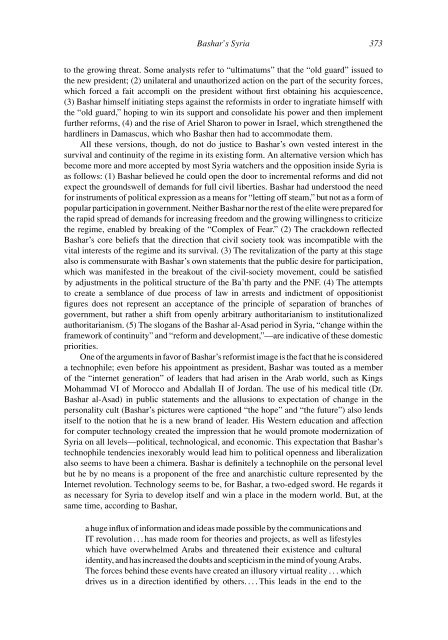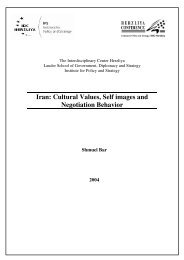Bashar's Syria: The Regime and its Strategic Worldview Shmuel Bar ...
Bashar's Syria: The Regime and its Strategic Worldview Shmuel Bar ...
Bashar's Syria: The Regime and its Strategic Worldview Shmuel Bar ...
Create successful ePaper yourself
Turn your PDF publications into a flip-book with our unique Google optimized e-Paper software.
Bashar’s <strong>Syria</strong> 373to the growing threat. Some analysts refer to “ultimatums” that the “old guard” issued tothe new president; (2) unilateral <strong>and</strong> unauthorized action on the part of the security forces,which forced a fait accompli on the president without first obtaining his acquiescence,(3) Bashar himself initiating steps against the reformists in order to ingratiate himself withthe “old guard,” hoping to win <strong>its</strong> support <strong>and</strong> consolidate his power <strong>and</strong> then implementfurther reforms, (4) <strong>and</strong> the rise of Ariel Sharon to power in Israel, which strengthened thehardliners in Damascus, which who Bashar then had to accommodate them.All these versions, though, do not do justice to Bashar’s own vested interest in thesurvival <strong>and</strong> continuity of the regime in <strong>its</strong> existing form. An alternative version which hasbecome more <strong>and</strong> more accepted by most <strong>Syria</strong> watchers <strong>and</strong> the opposition inside <strong>Syria</strong> isas follows: (1) Bashar believed he could open the door to incremental reforms <strong>and</strong> did notexpect the groundswell of dem<strong>and</strong>s for full civil liberties. Bashar had understood the needfor instruments of political expression as a means for “letting off steam,” but not as a form ofpopular participation in government. Neither Bashar nor the rest of the elite were prepared forthe rapid spread of dem<strong>and</strong>s for increasing freedom <strong>and</strong> the growing willingness to criticizethe regime, enabled by breaking of the “Complex of Fear.” (2) <strong>The</strong> crackdown reflectedBashar’s core beliefs that the direction that civil society took was incompatible with thevital interests of the regime <strong>and</strong> <strong>its</strong> survival. (3) <strong>The</strong> revitalization of the party at this stagealso is commensurate with Bashar’s own statements that the public desire for participation,which was manifested in the breakout of the civil-society movement, could be satisfiedby adjustments in the political structure of the Ba’th party <strong>and</strong> the PNF. (4) <strong>The</strong> attemptsto create a semblance of due process of law in arrests <strong>and</strong> indictment of oppositionistfigures does not represent an acceptance of the principle of separation of branches ofgovernment, but rather a shift from openly arbitrary authoritarianism to institutionalizedauthoritarianism. (5) <strong>The</strong> slogans of the Bashar al-Asad period in <strong>Syria</strong>, “change within theframework of continuity” <strong>and</strong> “reform <strong>and</strong> development,”—are indicative of these domesticpriorities.One of the arguments in favor of Bashar’s reformist image is the fact that he is considereda technophile; even before his appointment as president, Bashar was touted as a memberof the “internet generation” of leaders that had arisen in the Arab world, such as KingsMohammad VI of Morocco <strong>and</strong> Abdallah II of Jordan. <strong>The</strong> use of his medical title (Dr.Bashar al-Asad) in public statements <strong>and</strong> the allusions to expectation of change in thepersonality cult (Bashar’s pictures were captioned “the hope” <strong>and</strong> “the future”) also lends<strong>its</strong>elf to the notion that he is a new br<strong>and</strong> of leader. His Western education <strong>and</strong> affectionfor computer technology created the impression that he would promote modernization of<strong>Syria</strong> on all levels—political, technological, <strong>and</strong> economic. This expectation that Bashar’stechnophile tendencies inexorably would lead him to political openness <strong>and</strong> liberalizationalso seems to have been a chimera. Bashar is definitely a technophile on the personal levelbut he by no means is a proponent of the free <strong>and</strong> anarchistic culture represented by theInternet revolution. Technology seems to be, for Bashar, a two-edged sword. He regards itas necessary for <strong>Syria</strong> to develop <strong>its</strong>elf <strong>and</strong> win a place in the modern world. But, at thesame time, according to Bashar,a huge influx of information <strong>and</strong> ideas made possible by the communications <strong>and</strong>IT revolution . . . has made room for theories <strong>and</strong> projects, as well as lifestyleswhich have overwhelmed Arabs <strong>and</strong> threatened their existence <strong>and</strong> culturalidentity, <strong>and</strong> has increased the doubts <strong>and</strong> scepticism in the mind of young Arabs.<strong>The</strong> forces behind these events have created an illusory virtual reality . . . whichdrives us in a direction identified by others. . . . This leads in the end to the
















